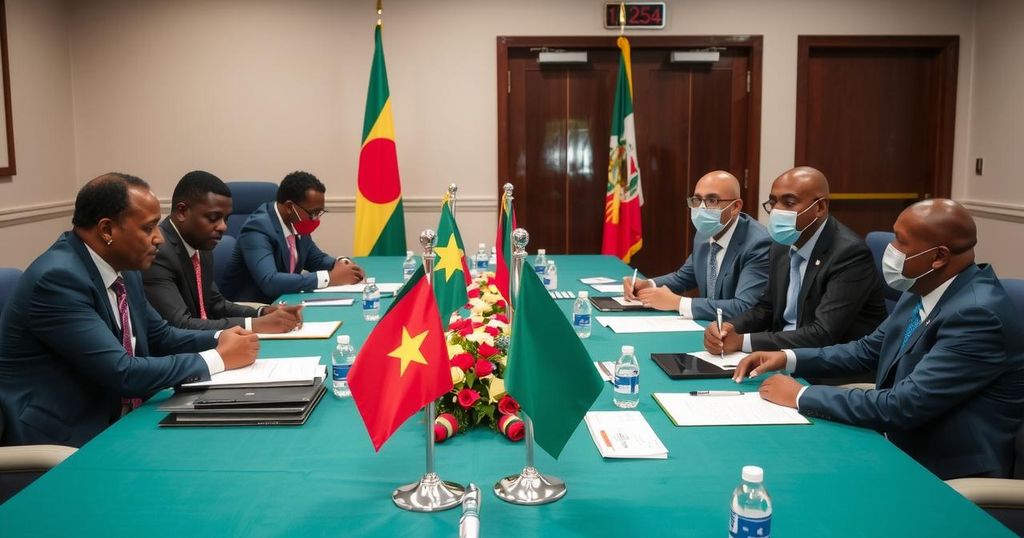Somalia’s Minister of Foreign Affairs, Ali Omar, led a delegation to Addis Ababa on December 14, 2017, to reinforce the Ankara Agreement, aimed at improving bilateral relations with Ethiopia. Key aspects of the agreement include Ethiopia’s access to maritime routes under Somali authority, peaceful dispute resolution, and cooperation for mutual prosperity. The visit represents a significant step toward strengthening ties and fostering stability in the Horn of Africa.
A delegation led by Somalia’s Minister of Foreign Affairs and International Cooperation, Ali Omar, has arrived in Addis Ababa on December 14, 2017. The purpose of this visit is to reaffirm and enhance the commitments established by the historic Ankara Agreement. The Ministry of Foreign Affairs of Somalia has indicated that the visit aims to “reinforce the commitments made in the Ankara Agreement” and further demonstrates Somalia’s dedication to fostering improved relations with Ethiopia as previously agreed upon with Turkish President Recep Tayyip Erdoğan during their discussions in Ankara.
The Ankara Agreement represents a significant advancement in peace and cooperation within the Horn of Africa, having been signed on December 2, 2017, by Ethiopian Prime Minister Abiy Ahmed and Somali President Hassan Sheikh Mohamud. Turkish President Erdoğan characterized the agreement as “historic,” with aspirations for it to contribute to enhanced regional stability. Critical components of the agreement include provisions granting Ethiopia access to a “reliable, safe, and sustainable sea passage under Somalia’s sovereign authority,” which is vital for Ethiopia’s economic development as a landlocked nation.
Prime Minister Abiy Ahmed emphasized Ethiopia’s commitment to resolving conflicts amicably, asserting that, “Ethiopia’s desire to have a sea passage is a peaceful endeavor that benefits our neighbors as well. This desire should not be viewed with suspicion but in the spirit of cooperation.” The delegation’s visit underscores ongoing efforts to strengthen the cooperative relationship between Ethiopia and Somalia, as articulated by Somalia’s Ministry of Foreign Affairs, which pledges to nurture ties among neighboring states founded on the principles of sovereignty, mutual respect, and shared goals.
The Ankara Agreement is characterized by key points, including mutual respect for sovereignty and territorial integrity, the establishment of a constructive partnership, recognition of contributions by Ethiopian soldiers in the African Union mission, provision for reliable maritime access, and the initiation of technical negotiations facilitated by Turkey. It also underscores the importance of peaceful dispute resolution, with Turkey’s mediation role accepted by both countries.
The implications of this agreement extend beyond bilateral relations, drawing attention from international leaders. French President Emmanuel Macron has publicly supported Ethiopia’s pursuit of maritime access through dialogue and adherence to international guidelines, emphasizing the growing global interest in the stability and economic potential of the Horn of Africa. This model of successful implementation of the Ankara Agreement could facilitate the resolution of regional conflicts and encourage economic collaboration, signifying a transformative period for both Ethiopia and Somalia.
The Ankara Agreement, formalized in December 2017, marks a pivotal moment in the relationship between Ethiopia and Somalia, nations historically intertwined yet often marked by conflict. The agreement stems from a recognition of mutual interests in promoting economic development and regional stability, particularly given Ethiopia’s landlocked status. Facilitated by Turkey, which aims to enhance its diplomatic presence in the region, the agreement lays the groundwork for a new partnership focused on building trust and collaboration, departing from previous tensions stemming from historical disputes over territory and governance.
In conclusion, the delegation’s visit to Addis Ababa symbolizes a renewed commitment between Somalia and Ethiopia to strengthen their bilateral relations in alignment with the Ankara Agreement. By addressing crucial issues such as maritime access and territorial sovereignty through constructive dialogue, both nations are poised to foster regional stability and economic development. The ongoing cooperation, bolstered by international support, suggests a promising future for enhanced relations and shared prosperity in the Horn of Africa.
Original Source: addisinsight.net






